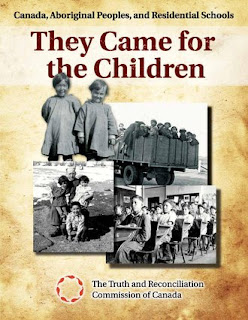Continuing from the previous three posts, my blog’s focus for the next several days is to raise awareness about the Truth and Reconciliation Commission of Canada's (TRC) Calls to Action. A summary of the whole report can be found at Honouring the Truth, Reconciling for the Future Summary of the Final Report of the Truth and Reconciliation Commission of Canada. Today, we read an excerpt from the Summary and the Call to Action aimed at Language: Call to Action 13.
“Some Survivors refused to teach their own children their Aboriginal languages and cultures because of the negative stigma that had come to be associated with them during their school years. This has contributed significantly to the fragile state of Aboriginal languages in Canada today.
Many of the almost ninety surviving Aboriginal languages in Canada are under serious threat of extinction. In the 2011 census, 14.5% of the Aboriginal population reported that their first language learned was an Aboriginal language. In the previ- ous 2006 census, 18% of those who identified as Aboriginal had reported an Aboriginal language as their first language learned, and a decade earlier, in the 1996 census, the figure was 26%. This indicates nearly a 50% drop in the fifteen years since the last res- idential schools closed. There are, however, variations among Aboriginal peoples: 63.7% of Inuit speak their Indigenous language, compared with 22.4% of First Nations people and only 2.5% of Métis people.
Some languages are close to extinction because they have only a few remain- ing speakers of the great-grandparent generation. The United Nations Educational, Scientific and Cultural Organization (unesco) lists 36% of Canada’s Aboriginal languages as being critically endangered, in the sense that they are used only by great-grandparent generations; 18% are severely endangered, in the sense that they are used by the great-grandparent and grandparent generations; and 16% are definitely endangered, in the sense that they are used by the parental and the two previous generations. The remaining languages are all vulnerable. If the preservation of Aboriginal languages does not become a priority both for governments and for Aboriginal communities, then what the residential schools failed to accomplish will come about through a process of systematic neglect.”
Language rights
In interpreting Aboriginal and Treaty rights under Section 35(1) of the Constitution Act, 1982, the Supreme Court of Canada has stressed the relation of those rights to the preservation of distinct Aboriginal cultures. The Commission concurs. The preserva- tion of Aboriginal languages is essential and must be recognized as a right.
Call to Action
13) We call upon the federal government to acknowledge that Aboriginal rights
include Aboriginal language rights.



